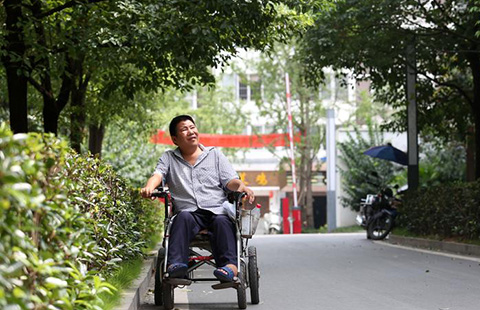Researchers to unveil drug that could slow Alzheimer's down
Updated: 2015-07-22 20:49
(Agencies)
|
||||||||
 |
|
An employee at a nursing home in Zhongshan, Guangdong province, helps a patient with dementia eat. Ye Zhiwen / for China Daily |
Patients with mild Alzheimer's disease who took Eli Lilly and Co's experimental drug solanezumab early in the course of their disease preserved more of their cognitive and functional ability, according to new Lilly data released on Wednesday.
Lilly presented new followup data from two large trials of the infused medicine on Wednesday at the Alzheimer's Association International Conference (AAIC) in Washington.
Researchers and investors have been keen to see if the results would firm up solanezumab as a lead contender to be the first treatment to effectively slow progression of the memory-robbing disease.
In 2012, the original 18-month studies of solanezumab, called Expedition and Expedition 2, each included about 1,000 patients with mild to moderate disease. The drug failed to slow cognitive declines or loss of abilities of daily living for the entire patient population.
But when Lilly analyzed results only for mild patients, the data suggested solanezumab caused a significant 34 percent slowdown in mental decline and an 18 percent slowdown in loss of functional abilities compared to placebo, researchers said.
To better assess whether mildly impaired patients benefit from the drug, Lilly extended its two trials by another two years and only enrolled those with mild disease. Researchers continued to provide solanezumab to patients who had taken it during the studies and also allowed patients who had been given placebos to switch over to solanezumab.
Lilly had previously reported that after the first six months of the extension study, patients who had taken solanezumab all along continued to show a greater benefit than those who switched to the drug later.
Company researchers on Wednesday said that difference remained statistically significant 12 months into the extension trial and continued to a lesser degree at two years.
"Visually, when you look at a graph, the two patient groups are seen as parallel lines," in terms of different cognition and functional abilities, said Hong Liu-Seifert, a research adviser at Lilly. "And we continued to see the two lines remain parallel to each other" over the two year extension.
Lilly said solanezumab was well tolerated during the extension study, having similar safety to that seen in earlier trials. But cardiac events were seen more frequently in the initial trials among patients taking solanezumab than in the placebo group, an issue that will be examined closely in a newer and larger trial called Expedition 3 that is now underway.
Should solanezumab prove successful in that 2,100-patient study of patients with mild Alzheimer's, within several years it could become the first approved drug to slow the course of the disease affecting 5 million Americans, Lilly officials said.
John Boris, an analyst with Suntrust Robinson Humphrey, estimates it has potential to capture more than $10 billion in annual sales and boost Lilly earnings for years to come.
Company shares have jumped 24 percent so far this year, compared with average 12 percent gains for other large drugmakers, largely on faith in solanezumab.
Lilly's Extension 3 study will only enroll patients shown by brain imaging tests to have beta amyloid brain plaques, and thus Alzheimer's rather than other types of dementia. Lilly estimates 25 percent of patients in the failed earlier Expedition studies actually had no beta amyloid deposits, and therefore would not have benefited from solanezumab.
Protein blocking
Solanezumab works by blocking formation of a protein called beta amyloid believed to cause toxic brain plaques that are considered a hallmark of Alzheimer's.
Eric Siemers, medical director for Lilly's Alzheimer's team, said if solanezumab can slow disease progression by roughly a third, as it did in the first two Phase III trials, that would be very meaningful to patients.
"In 18 months of treatment with solanezumab, patients could delay six months worth of progression" of Alzheimer's, he said. "That gives you more opportunity to do things that are important to you, before you progress into later stages of the disease."
Siemers said beta amyloid is believed to build up in the brain for 10 or 15 years and steadily kill neurons before Alzheimer's symptoms appear
Patients who took solanezumab from the start of earlier studies may have preserved many brain cells, he speculated, while those that began taking it later were not protected for the initial period. "They can't get those brain cells back; they are gone forever."

 UN displays Chinese actress Gong Li's portrait at exhibit
UN displays Chinese actress Gong Li's portrait at exhibit
 Family wades across flood to catch train
Family wades across flood to catch train
 Drought hits NE China
Drought hits NE China
 Firefighters launch Hollywood-style posters
Firefighters launch Hollywood-style posters
 Man overcomes disabilities to build thriving business
Man overcomes disabilities to build thriving business
 Rare imperial porcelain revealed for first time in Capital Museum
Rare imperial porcelain revealed for first time in Capital Museum
 Cosplay enthusiasts pose during 'Anime Friends' in Brazil
Cosplay enthusiasts pose during 'Anime Friends' in Brazil
 Top 10 services changed by online-to-offline
Top 10 services changed by online-to-offline
Most Viewed
Editor's Picks

|

|

|

|

|

|
Today's Top News
Xi, Obama exchange views on visit, Iran over phone
Wading through South China Sea sticking points
Drought forces Californians to make lifestyle changes
Thousands flock to donate sperm on Taobao's new service
Ling Jihua's arrest a vital lesson for officials
Cuba, US ties called first step
Life details of Tennessee shooter emerge, but motive elusive
China can now shop at JD.com's US Mall
US Weekly

|

|






